心理健康英文版ppt课件
- 格式:ppt
- 大小:2.70 MB
- 文档页数:14
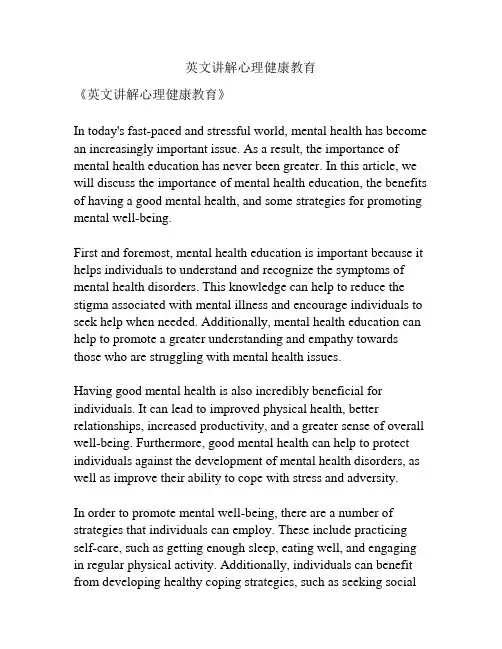
英文讲解心理健康教育《英文讲解心理健康教育》In today's fast-paced and stressful world, mental health has become an increasingly important issue. As a result, the importance of mental health education has never been greater. In this article, we will discuss the importance of mental health education, the benefits of having a good mental health, and some strategies for promoting mental well-being.First and foremost, mental health education is important because it helps individuals to understand and recognize the symptoms of mental health disorders. This knowledge can help to reduce the stigma associated with mental illness and encourage individuals to seek help when needed. Additionally, mental health education can help to promote a greater understanding and empathy towards those who are struggling with mental health issues.Having good mental health is also incredibly beneficial for individuals. It can lead to improved physical health, better relationships, increased productivity, and a greater sense of overall well-being. Furthermore, good mental health can help to protect individuals against the development of mental health disorders, as well as improve their ability to cope with stress and adversity.In order to promote mental well-being, there are a number of strategies that individuals can employ. These include practicing self-care, such as getting enough sleep, eating well, and engaging in regular physical activity. Additionally, individuals can benefit from developing healthy coping strategies, such as seeking socialsupport, practicing relaxation techniques, and developing problem-solving skills.In conclusion, mental health education is an important aspect of overall health and well-being. By increasing awareness and understanding of mental health issues, individuals and communities can work towards creating a more supportive and accepting environment for those who are struggling with mental health disorders. Additionally, by promoting good mental health, individuals can experience a greater sense of overall well-being and resilience in the face of life's challenges.。
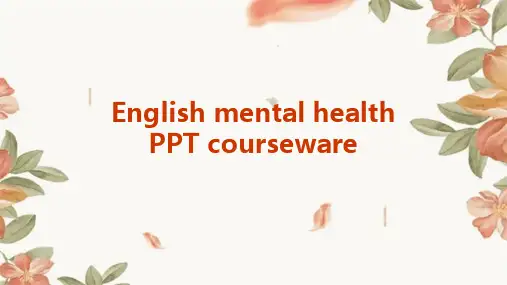
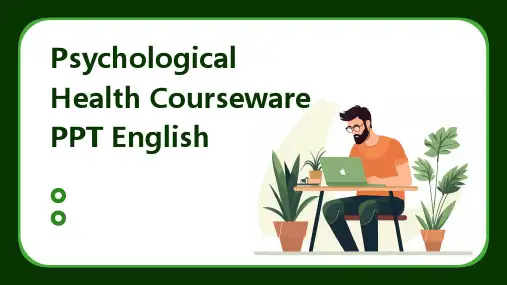
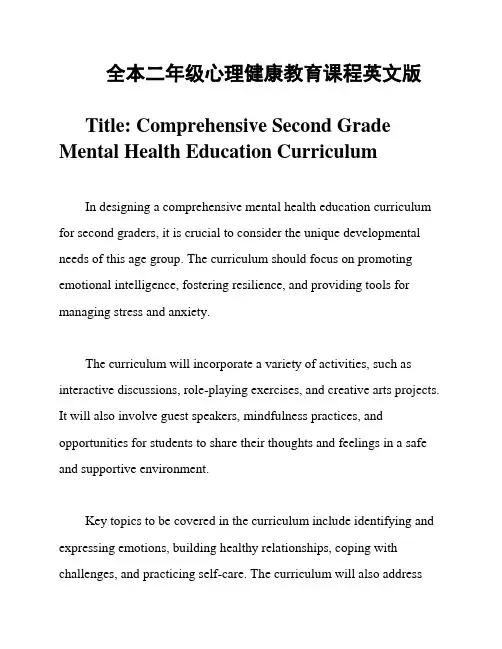
全本二年级心理健康教育课程英文版Title: Comprehensive Second Grade Mental Health Education Curriculum In designing a comprehensive mental health education curriculum for second graders, it is crucial to consider the unique developmental needs of this age group. The curriculum should focus on promoting emotional intelligence, fostering resilience, and providing tools for managing stress and anxiety.The curriculum will incorporate a variety of activities, such as interactive discussions, role-playing exercises, and creative arts projects. It will also involve guest speakers, mindfulness practices, and opportunities for students to share their thoughts and feelings in a safe and supportive environment.Key topics to be covered in the curriculum include identifying and expressing emotions, building healthy relationships, coping with challenges, and practicing self-care. The curriculum will also addresscommon mental health issues that may arise in childhood, such as bullying, peer pressure, and family changes.By implementing this mental health education curriculum, we aim to equip second graders with the knowledge and skills they need to navigate the complexities of their emotional well-being. Through a holistic approach that integrates social, emotional, and cognitive learning, we hope to foster a culture of mental wellness in our school community.Overall, this curriculum will serve as a foundation for promoting mental health awareness, reducing stigma, and empowering students to take control of their mental well-being. It is our belief that investing in early mental health education will have a lasting impact on the overall health and happiness of our students.。


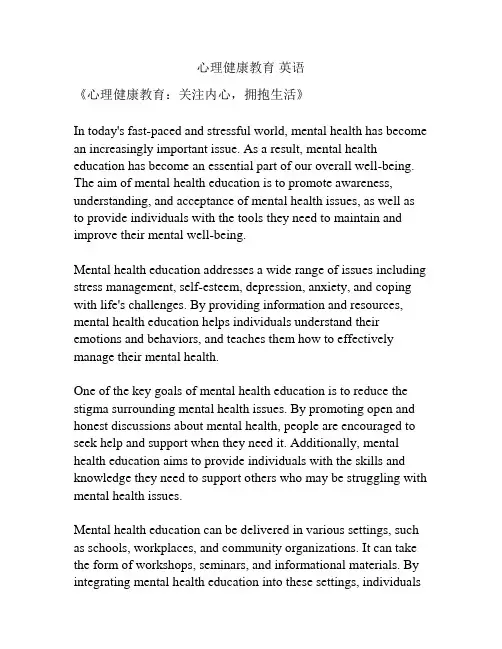
心理健康教育英语《心理健康教育:关注内心,拥抱生活》In today's fast-paced and stressful world, mental health has become an increasingly important issue. As a result, mental health education has become an essential part of our overall well-being. The aim of mental health education is to promote awareness, understanding, and acceptance of mental health issues, as well as to provide individuals with the tools they need to maintain and improve their mental well-being.Mental health education addresses a wide range of issues including stress management, self-esteem, depression, anxiety, and coping with life's challenges. By providing information and resources, mental health education helps individuals understand their emotions and behaviors, and teaches them how to effectively manage their mental health.One of the key goals of mental health education is to reduce the stigma surrounding mental health issues. By promoting open and honest discussions about mental health, people are encouraged to seek help and support when they need it. Additionally, mental health education aims to provide individuals with the skills and knowledge they need to support others who may be struggling with mental health issues.Mental health education can be delivered in various settings, such as schools, workplaces, and community organizations. It can take the form of workshops, seminars, and informational materials. By integrating mental health education into these settings, individualsare given the opportunity to learn about mental health in a supportive and understanding environment.Overall, mental health education plays a crucial role in promoting mental well-being and addressing the challenges that individuals may face. By providing individuals with the knowledge and resources they need to take care of their mental health, mental health education helps create a society that is more mindful, empathetic, and supportive of mental health issues. Through education and understanding, individuals can learn to embrace their inner struggles and lead fulfilling lives.。
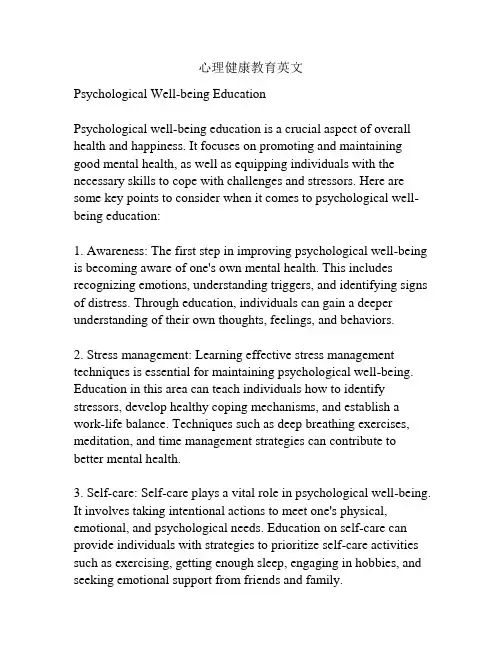
心理健康教育英文Psychological Well-being EducationPsychological well-being education is a crucial aspect of overall health and happiness. It focuses on promoting and maintaining good mental health, as well as equipping individuals with the necessary skills to cope with challenges and stressors. Here are some key points to consider when it comes to psychological well-being education:1. Awareness: The first step in improving psychological well-being is becoming aware of one's own mental health. This includes recognizing emotions, understanding triggers, and identifying signs of distress. Through education, individuals can gain a deeper understanding of their own thoughts, feelings, and behaviors.2. Stress management: Learning effective stress management techniques is essential for maintaining psychological well-being. Education in this area can teach individuals how to identify stressors, develop healthy coping mechanisms, and establish a work-life balance. Techniques such as deep breathing exercises, meditation, and time management strategies can contribute to better mental health.3. Self-care: Self-care plays a vital role in psychological well-being. It involves taking intentional actions to meet one's physical, emotional, and psychological needs. Education on self-care can provide individuals with strategies to prioritize self-care activities such as exercising, getting enough sleep, engaging in hobbies, and seeking emotional support from friends and family.4. Building resilience: Resilience is the ability to bounce back from adversity and adapt to challenging circumstances. Education in building resilience equips individuals with skills to navigate setbacks and cope with stress in a healthy manner. Techniques like positive self-talk, reframing negative thoughts, and seeking support from others can aid in building resilience.5. Compassion and empathy: The cultivation of compassion and empathy is crucial for fostering positive relationships and contributing to psychological well-being. Education on these qualities can teach individuals to understand and empathize with the experiences of others, fostering a sense of connection and overall well-being.In conclusion, psychological well-being education is essential for fostering good mental health and equipping individuals with the skills needed to navigate life's challenges. By promoting awareness, stress management, self-care, resilience, and compassion, we can strive towards a healthier and happier society.。
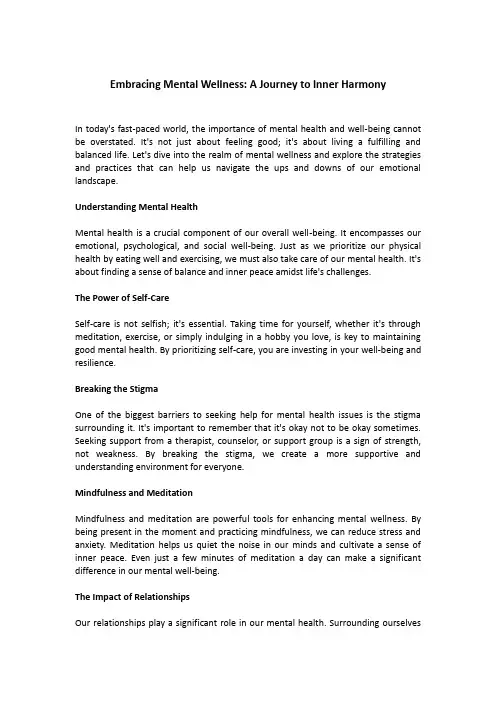
Embracing Mental Wellness: A Journey to Inner HarmonyIn today's fast-paced world, the importance of mental health and well-being cannot be overstated. It's not just about feeling good; it's about living a fulfilling and balanced life. Let's dive into the realm of mental wellness and explore the strategies and practices that can help us navigate the ups and downs of our emotional landscape.Understanding Mental HealthMental health is a crucial component of our overall well-being. It encompasses our emotional, psychological, and social well-being. Just as we prioritize our physical health by eating well and exercising, we must also take care of our mental health. It's about finding a sense of balance and inner peace amidst life's challenges.The Power of Self-CareSelf-care is not selfish; it's essential. Taking time for yourself, whether it's through meditation, exercise, or simply indulging in a hobby you love, is key to maintaining good mental health. By prioritizing self-care, you are investing in your well-being and resilience.Breaking the StigmaOne of the biggest barriers to seeking help for mental health issues is the stigma surrounding it. It's important to remember that it's okay not to be okay sometimes. Seeking support from a therapist, counselor, or support group is a sign of strength, not weakness. By breaking the stigma, we create a more supportive and understanding environment for everyone.Mindfulness and MeditationMindfulness and meditation are powerful tools for enhancing mental wellness. By being present in the moment and practicing mindfulness, we can reduce stress and anxiety. Meditation helps us quiet the noise in our minds and cultivate a sense of inner peace. Even just a few minutes of meditation a day can make a significant difference in our mental well-being.The Impact of RelationshipsOur relationships play a significant role in our mental health. Surrounding ourselveswith positive and supportive people can uplift our spirits and provide a sense of belonging. On the other hand, toxic relationships can drain our energy and negatively impact our mental well-being. It's essential to cultivate healthy and meaningful connections in our lives.Finding Joy in the Little ThingsIn the hustle and bustle of daily life, it's easy to overlook the simple pleasures that bring us joy. Whether it's enjoying a cup of tea in the morning, taking a leisurely walk in nature, or spending quality time with loved ones, finding joy in the little things can significantly impact our mental wellness. These moments of joy remind us of the beauty and positivity that surrounds us.Seeking Professional HelpIf you are struggling with your mental health, it's important to seek professional help. Therapists, counselors, and psychiatrists are trained to provide support and guidance through difficult times. There is no shame in reaching out for help when you need it. Remember, you are not alone on your journey to mental wellness.Embracing VulnerabilityVulnerability is not a sign of weakness; it's a sign of courage. By embracing our vulnerability and being open about our struggles, we create space for healing and connection. https:// It's okay to show your true emotions and ask for help when you need it. Vulnerability is the gateway to authenticity and deep human connection.Conclusion: A Journey to Inner HarmonyIn conclusion, prioritizing our mental health is a journey to inner harmony. By practicing self-care, seeking support, cultivating mindfulness, nurturing positive relationships, and embracing vulnerability, we can enhance our mental wellness and live a more fulfilling life. Remember, it's okay to not be okay sometimes, but it's essential to take steps to care for your mental well-being. Let's embark on this journey together, supporting each other along the way towards a brighter and more balanced future.。
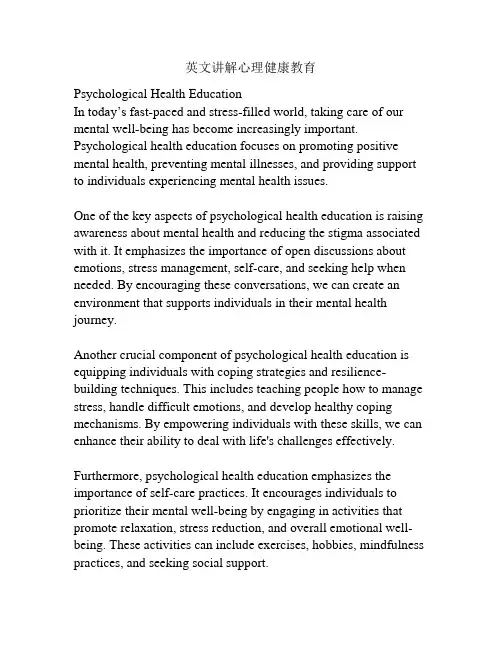
英文讲解心理健康教育Psychological Health EducationIn today’s fast-paced and stress-filled world, taking care of our mental well-being has become increasingly important. Psychological health education focuses on promoting positive mental health, preventing mental illnesses, and providing support to individuals experiencing mental health issues.One of the key aspects of psychological health education is raising awareness about mental health and reducing the stigma associated with it. It emphasizes the importance of open discussions about emotions, stress management, self-care, and seeking help when needed. By encouraging these conversations, we can create an environment that supports individuals in their mental health journey.Another crucial component of psychological health education is equipping individuals with coping strategies and resilience-building techniques. This includes teaching people how to manage stress, handle difficult emotions, and develop healthy coping mechanisms. By empowering individuals with these skills, we can enhance their ability to deal with life's challenges effectively. Furthermore, psychological health education emphasizes the importance of self-care practices. It encourages individuals to prioritize their mental well-being by engaging in activities that promote relaxation, stress reduction, and overall emotional well-being. These activities can include exercises, hobbies, mindfulness practices, and seeking social support.In addition to prevention and self-care, psychological health education also addresses the issue of mental health disorders. It educates individuals about various mental illnesses, their symptoms, and available treatment options. This knowledge helps reduce the fear and misunderstanding associated with mental health issues and encourages individuals to seek professional help when necessary.Finally, psychological health education promotes a supportive and inclusive community. It encourages individuals to be empathetic and understanding towards others' mental health struggles. By fostering a non-judgmental and accepting environment, we can create a space where individuals feel safe to reach out for help and support one another.In conclusion, psychological health education plays a vital role in promoting positive mental well-being. By raising awareness, providing coping strategies, encouraging self-care, tackling stigma, and fostering a supportive community, we can help individuals lead healthier and happier lives.。
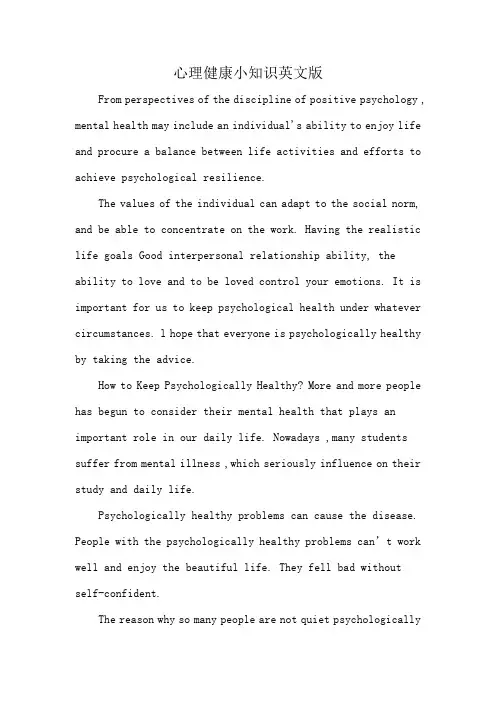
心理健康小知识英文版From perspectives of the discipline of positive psychology , mental health may include an individual's ability to enjoy life and procure a balance between life activities and efforts to achieve psychological resilience.The values of the individual can adapt to the social norm, and be able to concentrate on the work. Having the realistic life goals Good interpersonal relationship ability, the ability to love and to be loved control your emotions. It is important for us to keep psychological health under whatever circumstances. l hope that everyone is psychologically healthy by taking the advice.How to Keep Psychologically Healthy? More and more people has begun to consider their mental health that plays an important role in our daily life. Nowadays ,many students suffer from mental illness ,which seriously influence on their study and daily life.Psychologically healthy problems can cause the disease. People with the psychologically healthy problems can’t work well and enjoy the beautiful life. They fell bad withoutself-confident.The reason why so many people are not quiet psychologicallyhealthy is that the social pressure make them can’t relax themselves. For example, nowadays many people are worry about the house and job. In order to get a house, many people fight with life. They manage their life only keep the job in their mind. They always know that just work harder and harder. Even if they fell tiered and unhappy, they don’t care. For a long time, they take the pressure for themselves and can’t put down.How to keep the Psychologically Healthy? People should take part in some activities to relax themselves and make friends with other people. Do something that people interested in can make them fell more better.From what has been mentioned above, as students, we should try our best to communicate with our, friends, parents or teachers. Last but not the least; we should not hesitate to go to the mental health consult room for help when we have trouble in mental illness. Only in this way, can we reduce our mental illness, and we will become a strong and confident person in the end.。